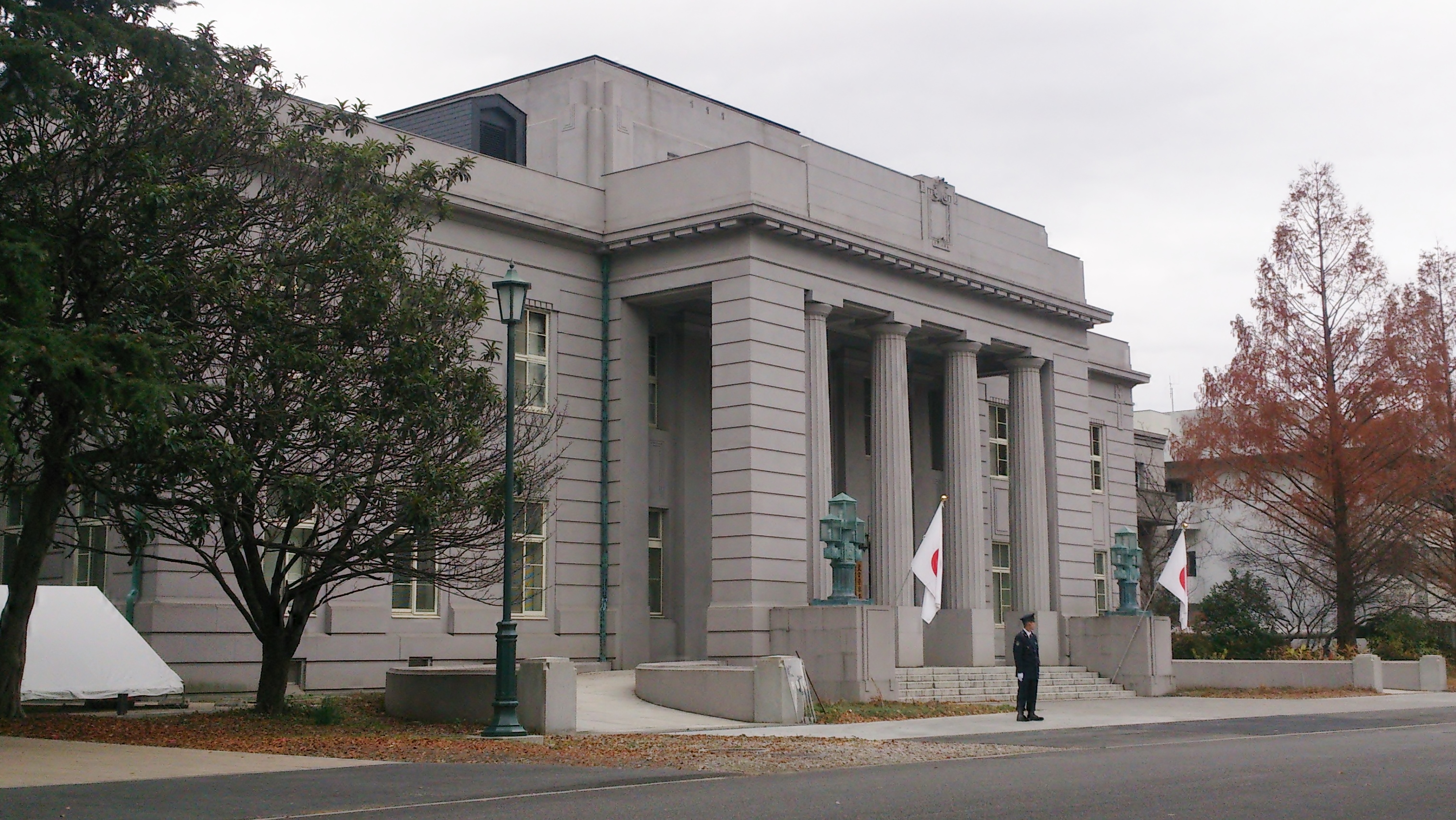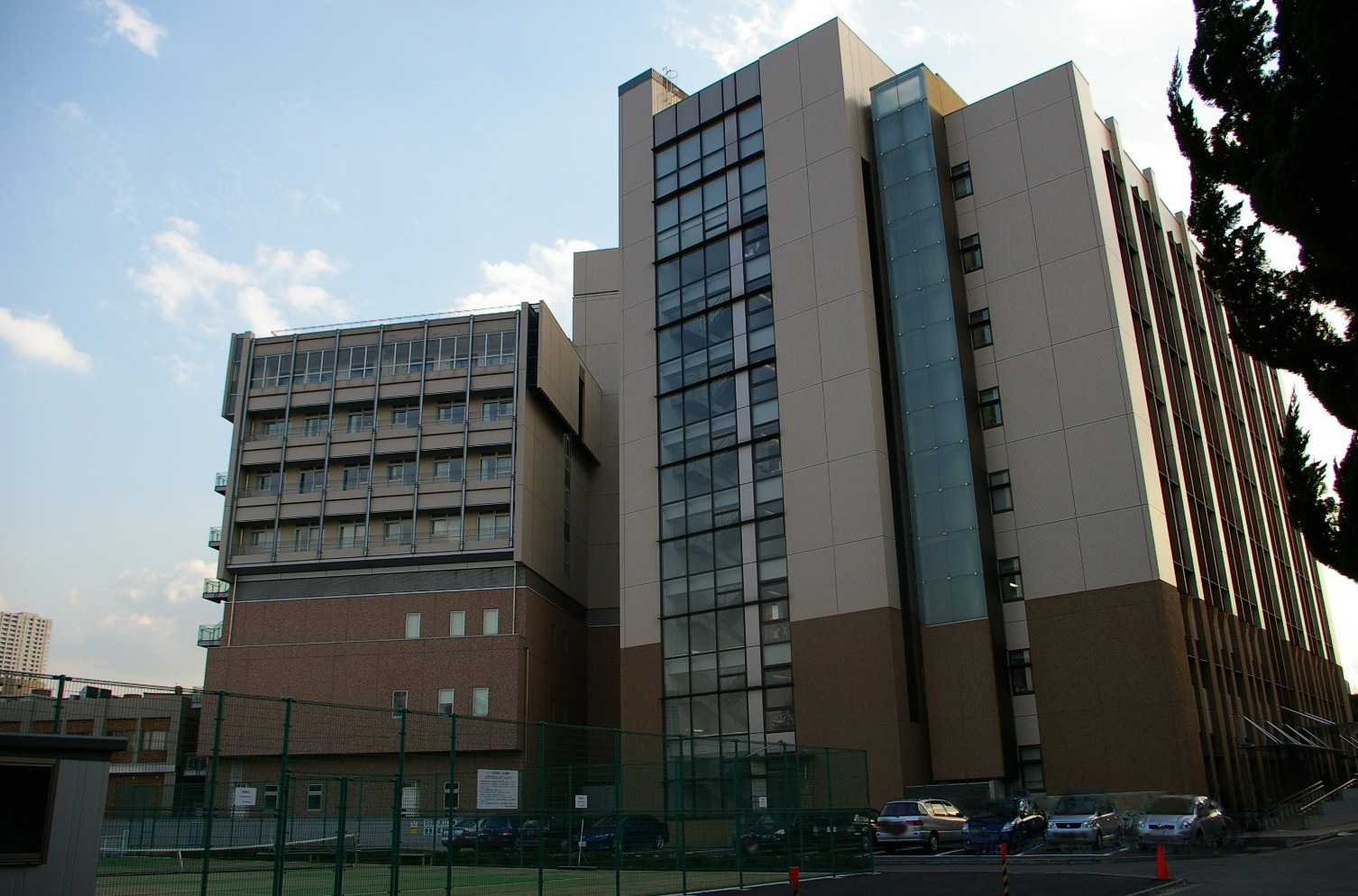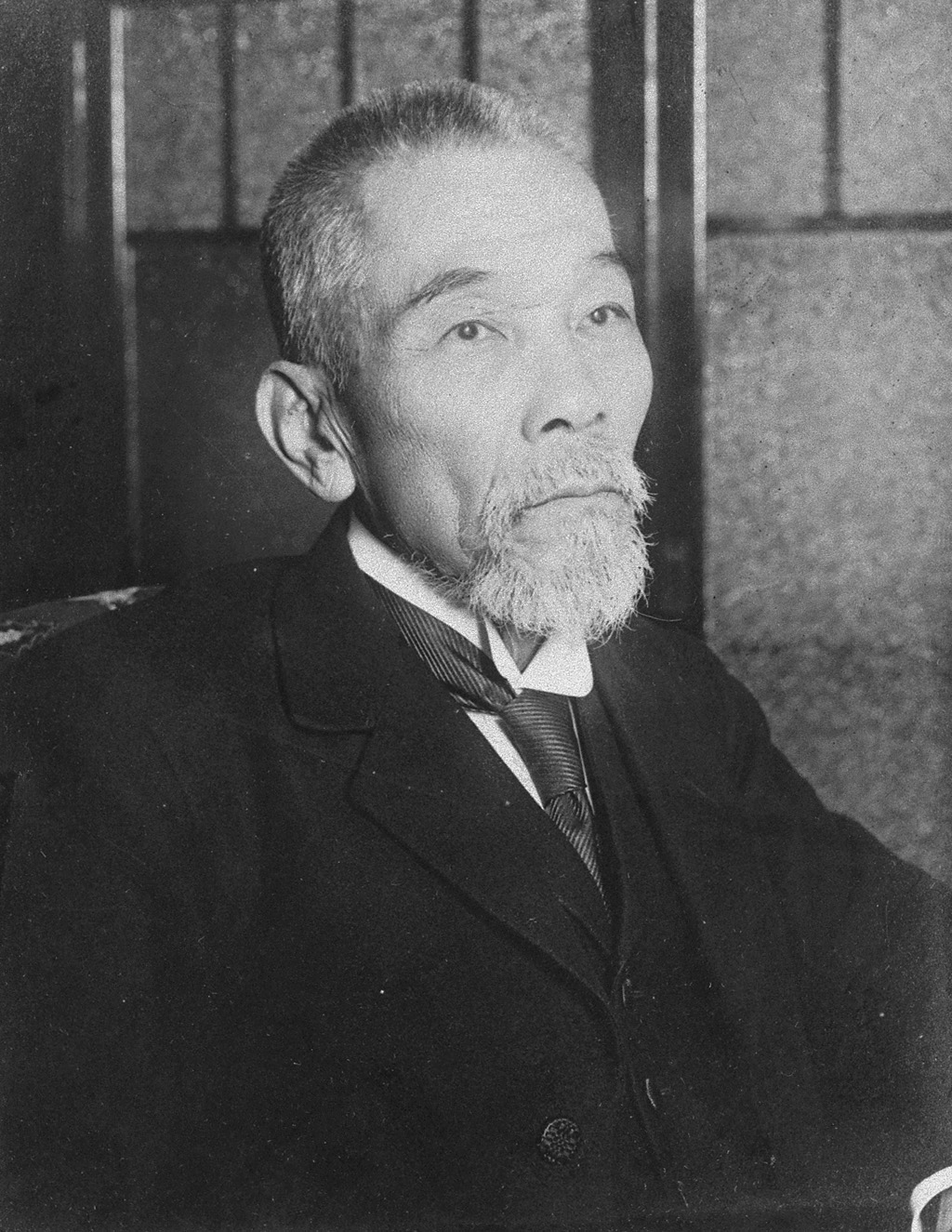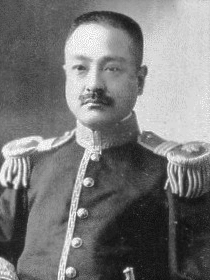|
Okano Keijirō
was a legal scholar, a politician and cabinet minister in the pre-war Empire of Japan. Okano was a native of Kōzuke Province (modern-day Gunma Prefecture). He graduated from the Kaisei Academy, followed by the Law School of Tokyo Imperial University, continuing on to graduate school to obtain a Doctor of law degree. He became professor of Tokyo Imperial University (''See Keijirō Okano ''). He worked as a bureaucrat at various cabinet ministries in the Meiji government, and was appointed to a seat in the Upper House of the Diet of Japan in 1908. He served as Director-General of the Cabinet Legislation Bureau under the 1st and 2nd Saionji administration (1906–1908; 1911–1912), and the 1st Yamamoto administration (1913). From 1913 to 1922, Okano served as Secretary to the Administrative Court. In 1922, Okano was appointed Minister of Justice in the cabinet of Prime Minister Katō Tomosaburō. In the subsequent 2nd Yamamoto Gonnohyōe administration, he held the por ... [...More Info...] [...Related Items...] OR: [Wikipedia] [Google] [Baidu] |
Empire Of Japan
The also known as the Japanese Empire or Imperial Japan, was a historical nation-state and great power that existed from the Meiji Restoration in 1868 until the enactment of the post-World War II 1947 constitution and subsequent formation of modern Japan. It encompassed the Japanese archipelago and several colonies, protectorates, mandates, and other territories. Under the slogans of and following the Boshin War and restoration of power to the Emperor from the Shogun, Japan underwent a period of industrialization and militarization, the Meiji Restoration, which is often regarded as the fastest modernisation of any country to date. All of these aspects contributed to Japan's emergence as a great power and the establishment of a colonial empire following the First Sino-Japanese War, the Boxer Rebellion, the Russo-Japanese War, and World War I. Economic and political turmoil in the 1920s, including the Great Depression, led to the rise of militarism, nationa ... [...More Info...] [...Related Items...] OR: [Wikipedia] [Google] [Baidu] |
Privy Council (Japan)
The was an advisory council to the Emperor of Japan that operated from 1888 to 1947. It was largely used to limit the power of the Imperial Diet. Functions Modeled in part upon the Privy Council of the United Kingdom, this body advised the Japanese Empire on matters including, but not limited to: * Proposed amendments to the Constitution of the Empire of Japan * Proposed amendments to the 1889 Imperial Household Law * Matters of constitutional interpretation, proposed laws, and ordinances * Proclamations of martial law or declaration of war * Treaties and other international agreements * Matters concerning the succession to the throne * Declarations of a regency under the Imperial Household Law; * Matters submitted by the Emperor directly The Privy Council had both judicial functions and certain executive functions. However, the council had no power to initiate legislation. Establishment To oversee new governmental developments, in 1871, three councils were created - the ... [...More Info...] [...Related Items...] OR: [Wikipedia] [Google] [Baidu] |
Kaisei Academy Alumni
Kaisei may refer to: * ''Kaisei'' (ship), the STS ''Kaisei'' * Kaisei, Kanagawa, a town in Japan * Kaisei Academy, a Japanese boys' school People with the name *, retired Japanese Brazilian professional sumo wrestler *, Japanese footballer See also * Project Kaisei Project Kaisei (from 海星, ''kaisei'', "ocean planet" in Japanese) is a scientific and commercial mission to study and clean up the Great Pacific Garbage Patch, a large body of floating debris trapped in the Pacific Ocean by the currents of t ..., a mission to clean up the Great Pacific garbage patch {{disambiguation, given name Japanese masculine given names ... [...More Info...] [...Related Items...] OR: [Wikipedia] [Google] [Baidu] |
Government Ministers Of Japan
A government is the system or group of people governing an organized community, generally a state. In the case of its broad associative definition, government normally consists of legislature, executive, and judiciary. Government is a means by which organizational policies are enforced, as well as a mechanism for determining policy. In many countries, the government has a kind of constitution, a statement of its governing principles and philosophy. While all types of organizations have governance, the term ''government'' is often used more specifically to refer to the approximately 200 independent national governments and subsidiary organizations. The major types of political systems in the modern era are democracies, monarchies, and authoritarian and totalitarian regimes. Historically prevalent forms of government include monarchy, aristocracy, timocracy, oligarchy, democracy, theocracy, and tyranny. These forms are not always mutually exclusive, and mixed gov ... [...More Info...] [...Related Items...] OR: [Wikipedia] [Google] [Baidu] |
1925 Deaths
Nineteen or 19 may refer to: * 19 (number), the natural number following 18 and preceding 20 * one of the years 19 BC, AD 19, 1919, 2019 Films * ''19'' (film), a 2001 Japanese film * ''Nineteen'' (film), a 1987 science fiction film Music * 19 (band), a Japanese pop music duo Albums * ''19'' (Adele album), 2008 * ''19'', a 2003 album by Alsou * ''19'', a 2006 album by Evan Yo * ''19'', a 2018 album by MHD * ''19'', one half of the double album ''63/19'' by Kool A.D. * ''Number Nineteen'', a 1971 album by American jazz pianist Mal Waldron * ''XIX'' (EP), a 2019 EP by 1the9 Songs * "19" (song), a 1985 song by British musician Paul Hardcastle. * "Nineteen", a song by Bad4Good from the 1992 album '' Refugee'' * "Nineteen", a song by Karma to Burn from the 2001 album ''Almost Heathen''. * "Nineteen" (song), a 2007 song by American singer Billy Ray Cyrus. * "Nineteen", a song by Tegan and Sara from the 2007 album '' The Con''. * "XIX" (song), a 2014 song by Slipk ... [...More Info...] [...Related Items...] OR: [Wikipedia] [Google] [Baidu] |
1865 Births
Events January–March * January 4 – The New York Stock Exchange opens its first permanent headquarters at 10-12 Broad near Wall Street, in New York City. * January 13 – American Civil War : Second Battle of Fort Fisher: United States forces launch a major amphibious assault against the last seaport held by the Confederates, Fort Fisher, North Carolina. * January 15 – American Civil War: United States forces capture Fort Fisher. * January 31 ** The Thirteenth Amendment to the United States Constitution (conditional prohibition of slavery and involuntary servitude) passes narrowly, in the House of Representatives. ** American Civil War: Confederate General Robert E. Lee becomes general-in-chief. * February ** American Civil War: Columbia, South Carolina burns, as Confederate forces flee from advancing Union forces. * February 3 – American Civil War : Hampton Roads Conference: Union and Confederate leaders discuss peace terms. * February 8 ... [...More Info...] [...Related Items...] OR: [Wikipedia] [Google] [Baidu] |
Maeda Toshisada
Viscount was a politician and cabinet minister in the pre-war Empire of Japan. Biography Toshisada Maeda was born in Tokyo, as the eldest son of Maeda Toshiaki, the final ''daimyō'' of Nanokaichi Domain in Kōzuke Province, and inherited his father’s ''kazoku'' peerage title of ''shishaku'' (viscount). His brother, Toshinari, was a general in the Imperial Japanese Army Toshisada Maeda was a graduate of Tokyo Imperial University. He served briefly in the infantry during the First Sino-Japanese War in 1894, and afterwards assumed his family’s seat in the House of Peers of the Diet of Japan. In 1922, he was appointed Communications Minister in the cabinet of Prime Minister Katō Tomosaburō. He subsequently served in the cabinet of Prime Minister Kiyoura Keigo as Minister of Agriculture and Commerce. He retired from public life in January 1944, and died in October of the same year. He was posthumously awarded the Order of the Sacred Treasures, 1st class. Maeda studied p ... [...More Info...] [...Related Items...] OR: [Wikipedia] [Google] [Baidu] |
Egi Kazuyuki
Egi Kazuyuki (May 21, 1853 – August 23, 1932) was a Japanese politician who served as governor of Hiroshima Prefecture in 1898–1903. He was born in Yamaguchi Prefecture. He was also governor of Ibaraki Prefecture (1896–1897), Tochigi Prefecture (1897), Aichi Prefecture (1897–1898) and Kumamoto Prefecture (1903–1907). He was a recipient of the Order of the Rising Sun (4th class, 1896; 2nd class, 1902; 1st class, 1906) and the Order of the Sacred Treasure (4th class, 1895; 3rd class, 1899) as well as being a member of the French Legion of Honour The National Order of the Legion of Honour (french: Ordre national de la Légion d'honneur), formerly the Royal Order of the Legion of Honour ('), is the highest French order of merit, both military and civil. Established in 1802 by Napoleon, ... (joined 1901). {{DEFAULTSORT:Kazuyuki, Egi 1853 births 1932 deaths Japanese Home Ministry government officials Governors of Ibaraki Prefecture Governors of Tochigi Pre ... [...More Info...] [...Related Items...] OR: [Wikipedia] [Google] [Baidu] |
Ministry Of Education, Culture, Sports, Science And Technology
The , also known as MEXT or Monka-shō, is one of the eleven Ministries of Japan that composes part of the executive branch of the Government of Japan. Its goal is to improve the development of Japan in relation with the international community. The ministry is responsible for funding research under its jurisdiction, some of which includes: children's health in relation to home environment, delta-sigma modulations utilizing graphs, gender equality in sciences, neutrino detection which contributes to the study of supernovas around the world, and other general research for the future. History The Meiji government created the first Ministry of Education in 1871. In January 2001, the former Ministry of Education, Science, Sports and Culture and the former merged to become the present MEXT. Organization The Ministry of Education, Culture, Sports, Science and Technology currently is led by the Minister of Education, Culture, Sports, Science and Technology. Under that position i ... [...More Info...] [...Related Items...] OR: [Wikipedia] [Google] [Baidu] |
Inukai Tsuyoshi
Inukai Tsuyoshi ( ja, 犬養 毅, 4 June 1855 – 15 May 1932) was a Japanese politician, cabinet minister, and Prime Minister of Japan from 1931 to his assassination in 1932. Inukai was Japan's second oldest prime minister while serving, as he was aged 76 on the day he was murdered, after Kantarō Suzuki (at aged 77). Early life Inukai was born to a samurai family of Niwase Domain, in Niwase village, Bizen Province (now part of Okayama city, Okayama Prefecture), where his father had been a local official and magistrate under the Tokugawa shogunate. In 1876, Inukai travelled to Tokyo and subsequently graduated from the Keio Gijuku (now Keio University) where he specialized in Chinese studies. In his early career, Inukai worked as a journalist for the ''Yūbin Hōchi Shimbun'' (now a sports newspaper subsidiary of the ''Yomiuri Shimbun'') and ''Akita Sakigake Shimpō''. He went with the Imperial Japanese Army to the front during the Satsuma Rebellion as a reporter. Political ... [...More Info...] [...Related Items...] OR: [Wikipedia] [Google] [Baidu] |
Den Kenjirō
Baron was a Japanese politician and cabinet minister in the pre-war government of the Empire of Japan. He was also the 8th Japanese Governor-General of Taiwan from October 1919 to September 1923, and the first civilian to hold that position. Den was also a co-founder of Kaishinsha Motorcar Works, a predecessor to present-day Nissan and the original manufacturer of ''Datsun'' automobiles. Biography Den was born in Tanba-Kaibara Domain, located in Hikami District of Tanba Province (part of the modern-day city of Tanba, Hyōgo), where his father was a village headman (''nanushi''). After the Meiji Restoration, he sought his fortune in Kumamoto Prefecture (1874), followed by Aichi Prefecture in 1875. Entering service of the police department, he was subsequently assigned to Kōchi Prefecture, Kanagawa Prefecture and Saitama Prefecture. Around 1890, he came to the attention of Communications Minister Gotō Shōjirō, who recruited him into the central bureaucracy of the Meiji go ... [...More Info...] [...Related Items...] OR: [Wikipedia] [Google] [Baidu] |
Enkichi Ōki
Count was a Japanese statesman in the Taishō period. Ōki was born in Tokyo. His father, Ōki Takatō was one of the leaders in the Meiji Restoration, and served in numerous cabinet posts in the early Meiji government. In 1899, Enkichi succeeded to his father’s title of count (''hakushaku'') under the ''kazoku'' peerage system. His political career began in 1908, when he was elected to the House of Peers. He initially supported the '' Kenkyūkai'', but soon switched his allegiance to the ''Rikken Seiyūkai''. He was appointed Justice Minister under the cabinet of Prime Minister Hara, a post which he also held under the succeeding Takahashi administration. In 1923, he cooperated with Home Minister The Minister of Home Affairs (or simply, the Home Minister, short-form HM) is the head of the Ministry of Home Affairs of the Government of India. One of the senior-most officers in the Union Cabinet, the chief responsibility of the Home Minist ... Tokonami Takejirō to introd ... [...More Info...] [...Related Items...] OR: [Wikipedia] [Google] [Baidu] |






